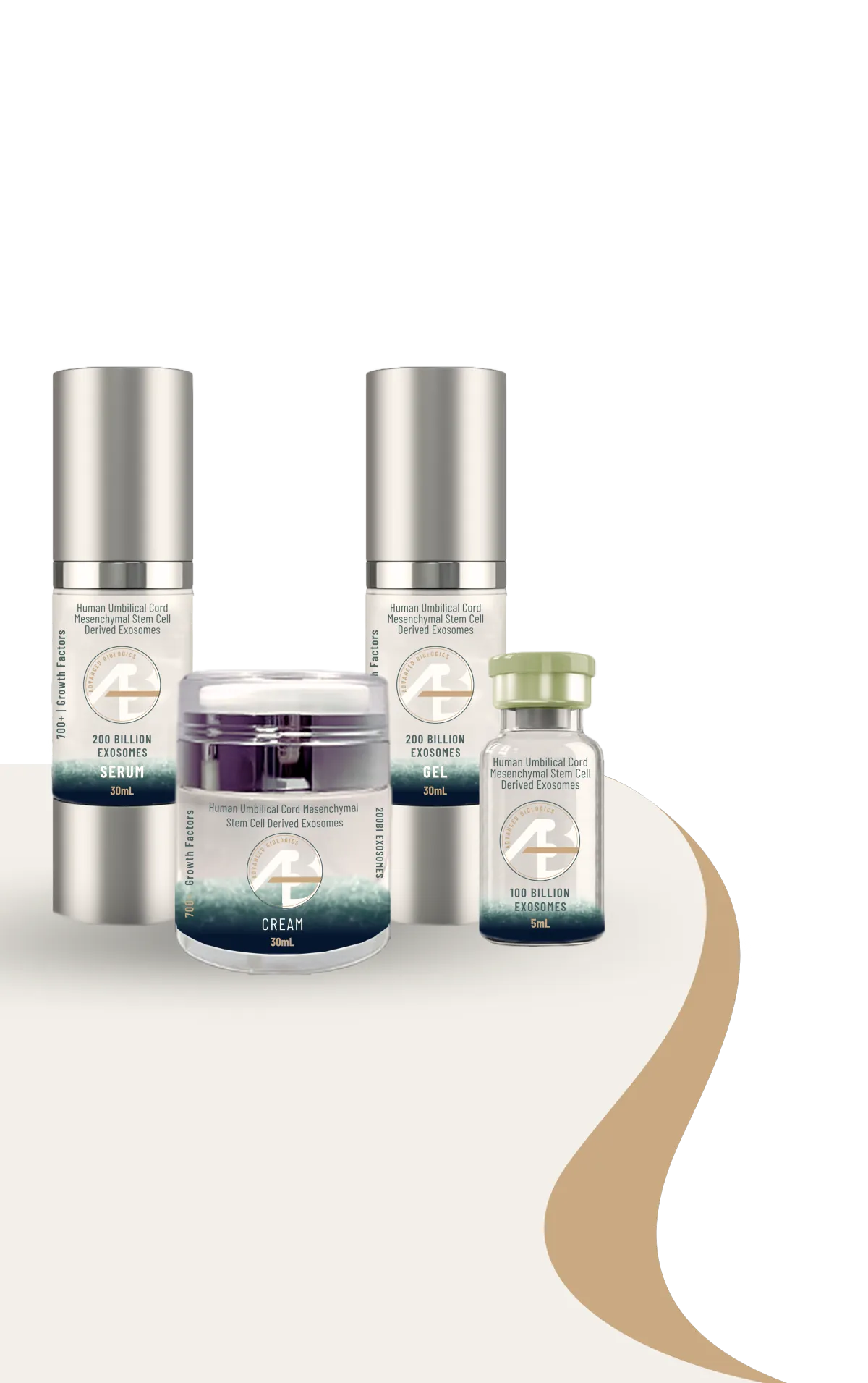

WOUND HEALING
Reduce Expression of IL-1β | IL-6 | TNF-ɑ
Increase Collagen Expression

PRO - AGING
Inhibition of (SA-β-Gal) synthesis
Increase the synthesis of NAD+
Decrease Expression of MMPs

HYPERPIGMENTATION
Inhibits the formation of melanin
What you can do to your clients

Minimized Discomfort
Exolence accelerate wound healing and minimize inflammation, reducing downtime and discomfort associated with medical treatments.

Enhanced Efficacy
AB Exosomes contain +700 growth factors, cytokines and other high regenerative molecules that promote tissue repair and regeneration, enhancing the effects of medical treatments.

Long-lasting Results
By promoting collagen production, improving skin texture and tone, and enhancing overall skin health. Clients can enjoy the benefits of their treatments for an extended period.
MSC exosomes work by harnessing
the natural regenerative and
Pro-aging capabilities to:
rejuvenate the skin
stimulate collagen production
reduce oxidative stress and inflammation
promote overall skin health and vitality
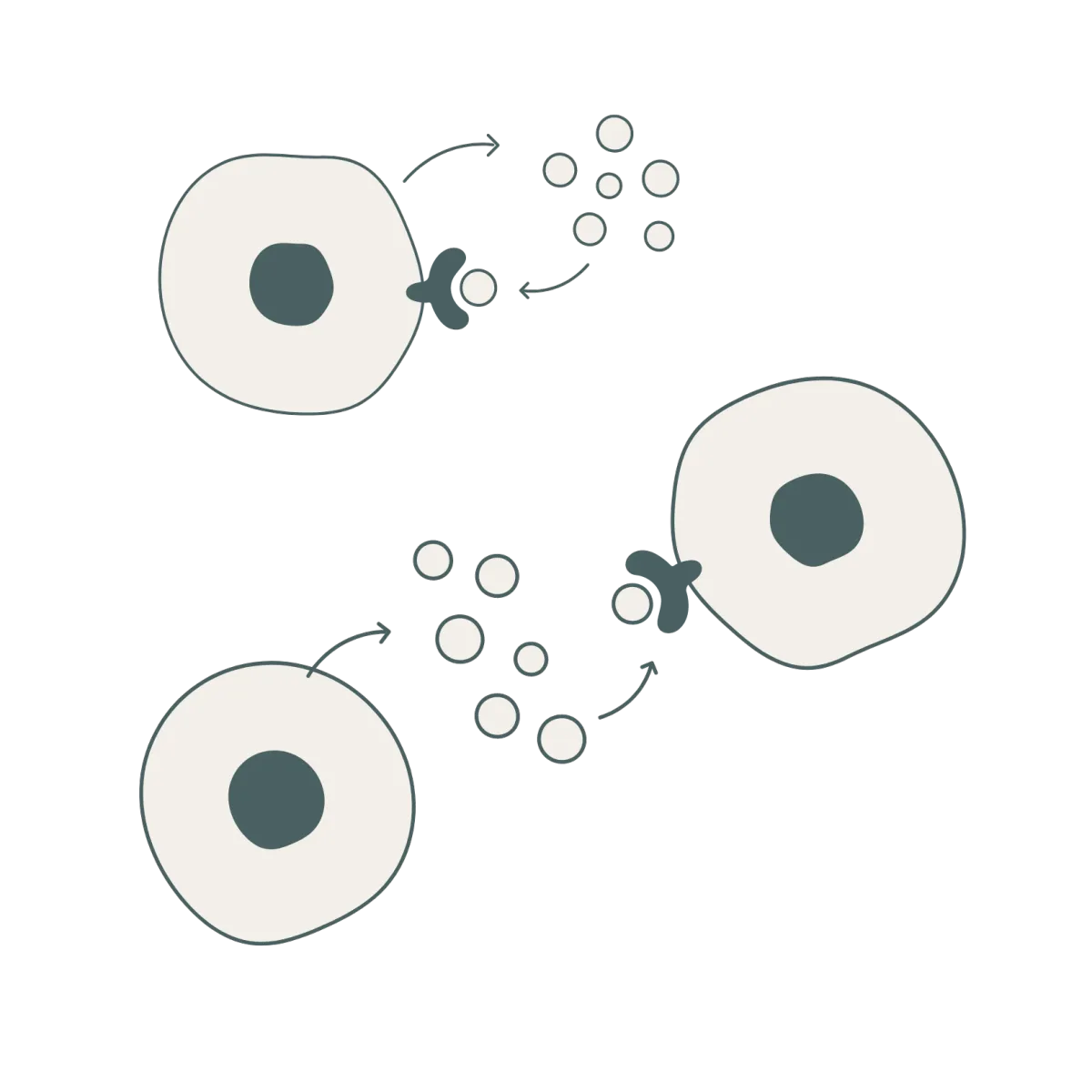
CELLULAR COMMUNICATION
UC MSC Exosomes contain a diverse range of bioactive molecules such as proteins, lipids, and nucleic acids. With a unique structure, these components can modulate cellular processes by, Exosomes can interact with skin cells, promoting cellular communication and signalling pathways associated with rejuvenation.
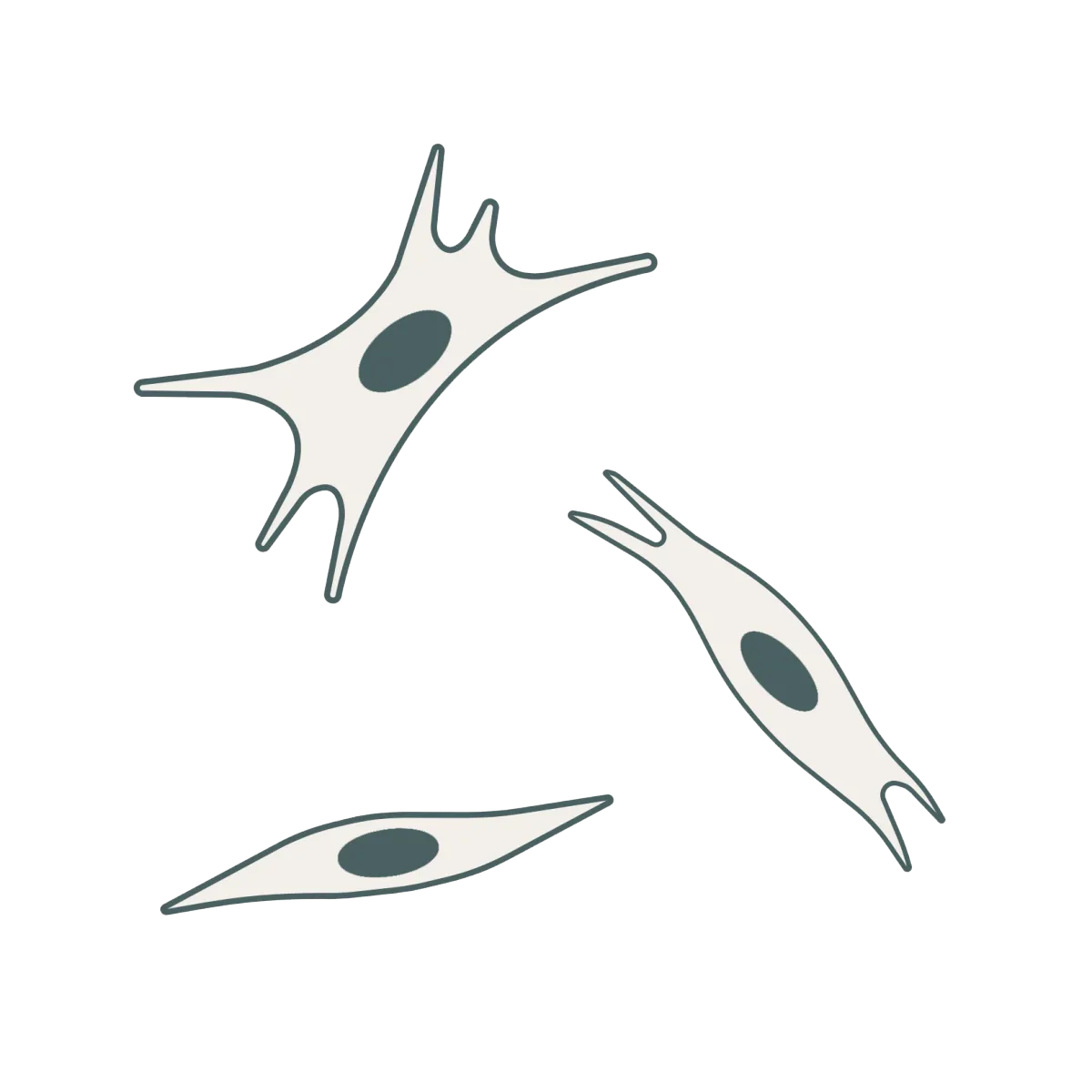
STIMULATING COLLAGEN PRODUCTIONS
Collagen is a protein essential for maintaining skin elasticity and firmness. Aging leads to a decline in collagen production, resulting in sagging and wrinkles. Advanced Biologics exosomes stimulate fibroblasts, the cells responsible for collagen synthesis, leading to increased collagen production. This helps in improving skin texture and reducing the appearance of wrinkles.
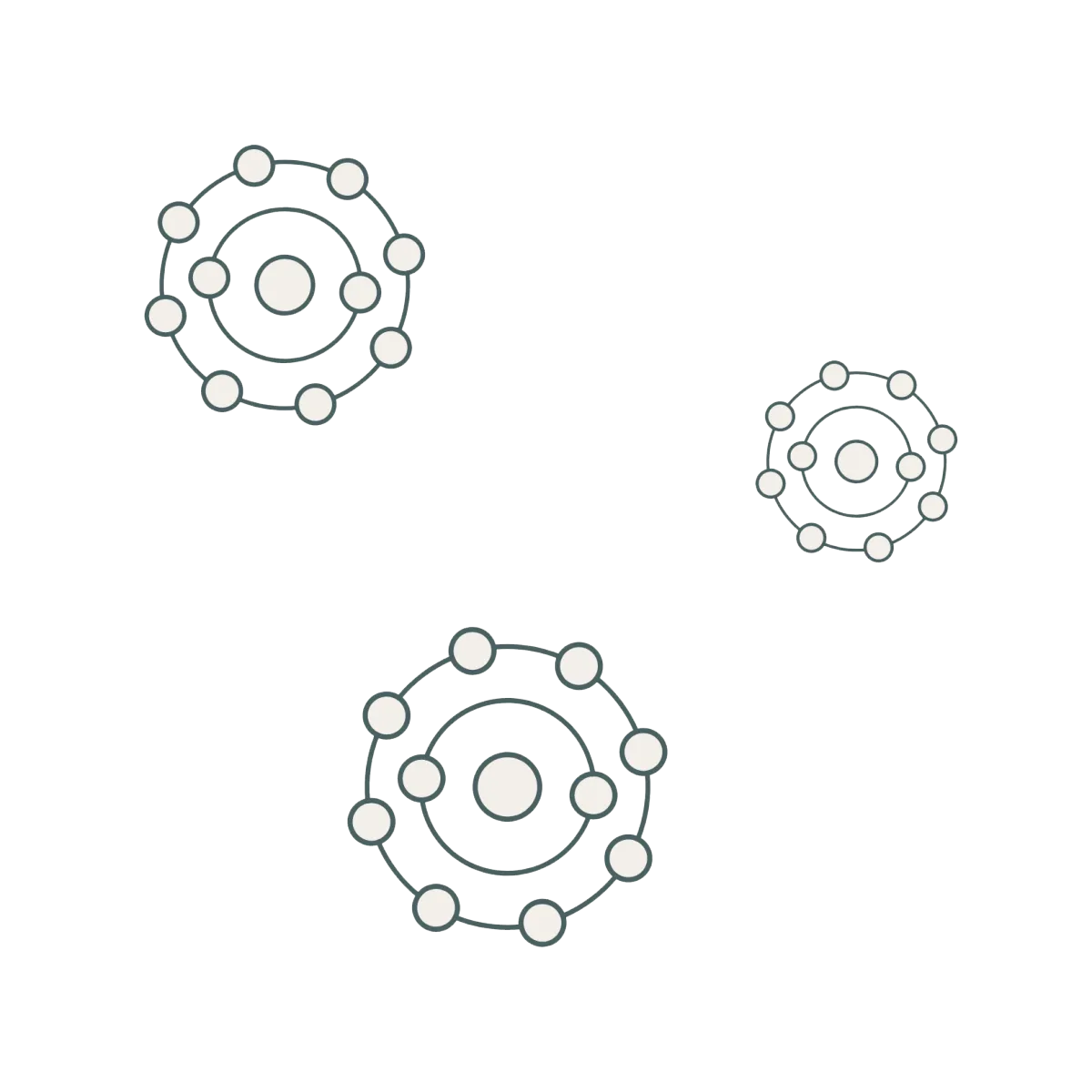
ANTIOXIDANT PROPERTIES
Oxidative stress is a major contributor to skin aging, causing damage to cellular structures and accelerating the formation of wrinkles. MSC exosomes contain antioxidant molecules that can neutralize free radicals and reduce oxidative damage to the skin. This antioxidant activity helps in preserving skin health and preventing premature aging.
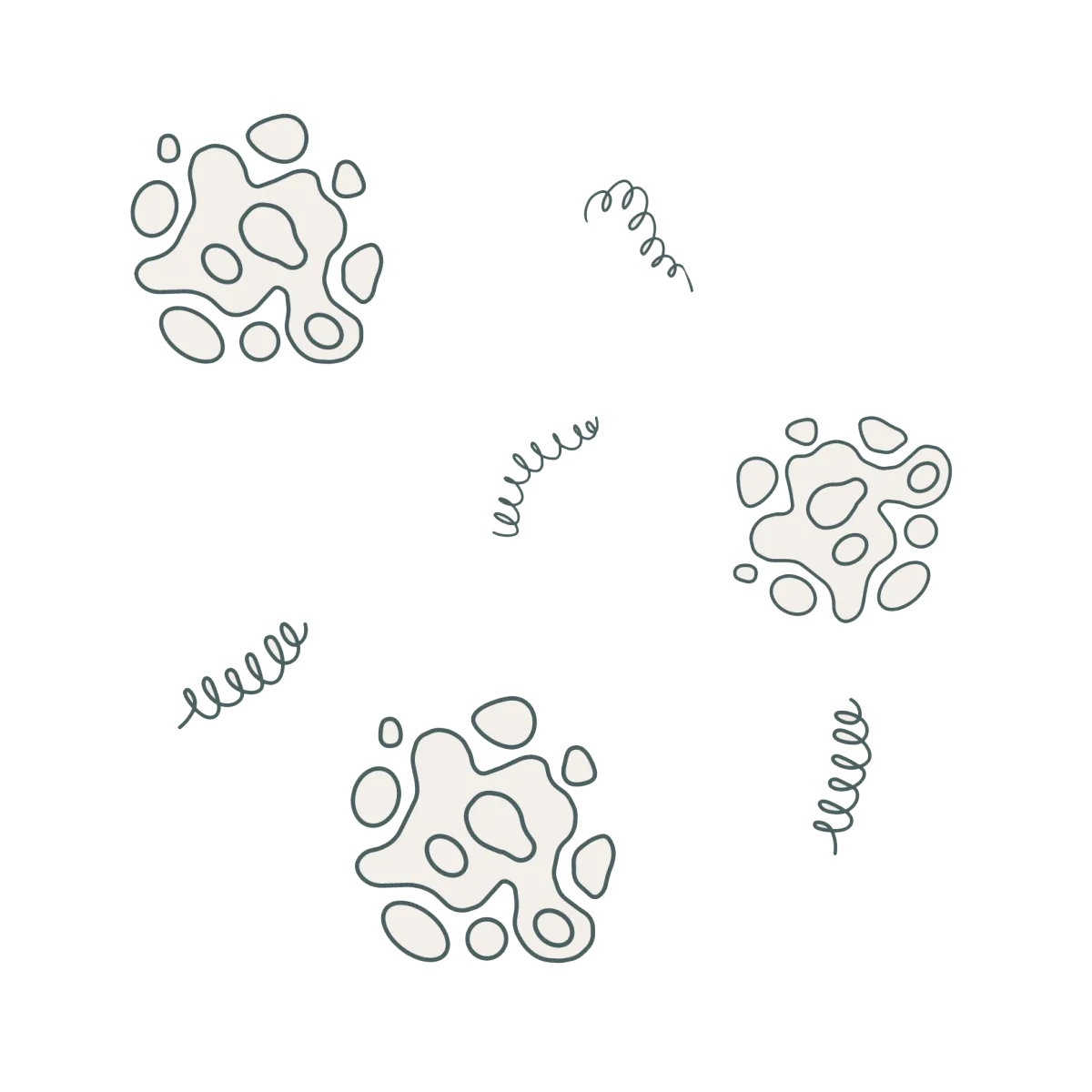
PROMOTING SKIN REGENERATION
MSC exosomes contain growth factors and cytokines that promote tissue regeneration and repair. When applied to the skin, they can enhance the skin's ability to heal and regenerate, resulting in improved skin tone, texture, and overall appearance.

ANTI-INFLAMMATORY EFFECTS
Inflammation is another key factor in skin aging, contributing to various skin conditions such as acne, rosacea, and wrinkles. MSC exosomes have anti-inflammatory properties that can help calm inflamed skin and reduce redness, leading to a more youthful and radiant complexion.
innovative and effective skincare solutions
pro Aging
Stimulate collagen and elastin production, enhance skin hydration, and provide potent antioxidant protectionWith proven clinical efficacy and safety, AB Exosomes delivers remarkable results, reducing the appearance of fine lines, wrinkles, and age spots while promoting cellular renewal and regeneration.
Dark Eye Circles
Exolence target the root causes of periorbital hyperpigmentation. By regulating melanin synthesis, enhancing
microcirculation, and reducing inflammation, exosomes effectively diminish dark eye circles and rejuvenate the delicate skin around the eyes.
Acne Scars
Stimulating collagen induction and tissue regeneration, Exolence effectively fill in depressed scars and promote a smoother, more even skin surface. Additionally, their anti-inflammatory properties help prevent the formation of hypertrophic or keloid scars, leading to improved healing and scar resolution.
Even Skin Tone
Regulating melanin production, promoting depigmentation and brightening, and reducing inflammation, Exolence effectively restore balance to the skin, revealing a more luminous and uniform complexion. Additionally, their ability to enhance skin renewal and protect against environmental damage ensures long-lasting results and skin health.
Treat Burns
Addressing key factors such as tissue regeneration, inflammation reduction, and collagen remodelling. By harnessing the regenerative power of exosomes derived from mesenchymal stem cells (MSCs), Exolence stimulate the proliferation of essential skin cells and promote the formation of new blood vessels, accelerating the healing process and minimizing scar formation.
Diminish Scars
A comprehensive approach to scar reduction by targeting key factors such as collagen modulation, tissue remodeling, and angiogenesis promotion. Exolence delivers remarkable results, improving scar texture, thickness, and tone.
STRETCH MARKS
Stimulating collagen remodeling and promoting tissue regeneration, Exolence effectively diminish the appearance of stretch marks, reducing their size, depth, and pigmentation. Additionally, their anti-inflammatory properties alleviate tissue damage and foster a conducive environment for skin repair.
Customized treatment plans can be created tailored to each client's unique skincare concerns and goals by combining medical treatments with our exosomes.
Benefits combining skincare treatments with Advanced Biologics Exosomes
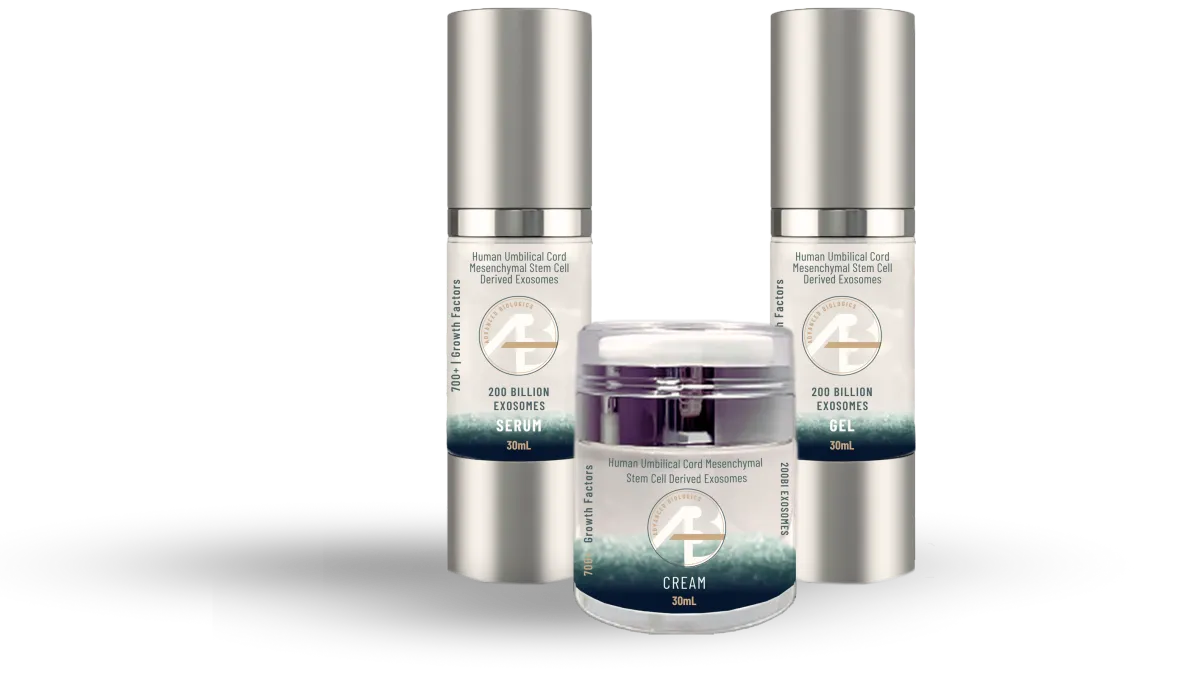
CHEMICAL PEELS + TOPICAL EXOSOMES
Enhanced Skin Rejuvenation: Chemical peels exfoliate the outer layer of dead skin cells, promoting cellular turnover and revealing fresher, healthier-looking skin underneath. Applying our exosomes after a chemical peel further support skin rejuvenation by delivering growth factors, cytokines, and other signaling molecules directly to the skin cells, promoting repair and regeneration.
Stimulation of Collagen Production: Chemical peels stimulate the production of collagen, a protein that provides structural support to the skin and helps maintain its firmness and elasticity. Exolence contain +700 growth factors that promote collagen synthesis, leading to firmer, more youthful-looking skin over time.
Reduction in Fine Lines and Wrinkles: Chemical peels can help to reduce the appearance of fine lines and wrinkles by promoting collagen production and smoothing out the skin's texture. Exosomes complement this effect by supporting cellular turnover and rejuvenation, leading to smoother, more youthful-looking skin.
Improved Absorption of Exosomes: Chemical peels create a more receptive environment for skincare products by removing the outer layer of dead skin cells, allowing better penetration of active ingredients like exosomes. This can enhance the delivery of exosomes to the deeper layers of the skin, where they can exert their rejuvenating effects.
Reduction in Hyperpigmentation and Sun Damage: Chemical peels can help to improve the appearance of hyperpigmentation, sunspots, and uneven skin tone by exfoliating the outer layers of the skin where these imperfections are most visible. Exosomes complement this effect by promoting skin regeneration and reducing the appearance of pigmentation irregularities.
Accelerated Healing and Recovery: AB Exosomes accelerate wound healing and tissue repair. When applied after a chemical peel, exosomes speed up the healing process and minimize downtime, allowing for quicker recovery and smoother results.

MICRO | DERMABRASION + TOPICAL EXOSOMES
Enhanced Skin Rejuvenation: Microdermabrasion mechanically exfoliates the skin, promoting cellular turnover and revealing fresher, healthier-looking skin. Exosomes support skin rejuvenation by delivering +700 growth factors and other signaling molecules that promote tissue repair, collagen production, and overall skin renewal. This combination enhance the effects of microdermabrasion, leading to more significant improvements in skin texture and appearance.
Reduced Downtime and Side Effects: Microdermabrasion typically has minimal downtime and side effects, but combining it with exosomes help further reduce any potential discomfort or irritation associated with the treatment. AB Exosomes promote faster healing and tissue regeneration, minimizing downtime and the risk of side effects such as redness, swelling, and irritation after microdermabrasion.
Improved Skin Texture and Tone: Microdermabrasion helps to exfoliate the outer layers of the skin, resulting in smoother, more even-toned skin. When combined with our exosomes, which promote cellular repair and collagen production, this treatment can lead to enhanced skin texture and tone. It reduces the appearance of wrinkles, fine lines, and pigmentation irregularities, resulting in a more youthful and radiant complexion.
Promotion of Collagen Synthesis: Microdermabrasion stimulates collagen production in the skin, contributing to its firmness and elasticity. Exolence contain +700 growth factors that enhance collagen synthesis, leading to firmer, more resilient skin over time. This combination treatment combats the signs of aging and improve skin elasticity.
Targeted Delivery of Growth Factors: AB Exosomes deliver +700 growth factors and other bioactive molecules directly to the skin cells, where they can exert their rejuvenating effects. When applied after microdermabrasion, our exosomes penetrate deeply into the skin, maximizing the efficacy and promoting optimal skin health and regeneration.

LASER THERAPY + TOPICAL EXOSOMES
Enhanced Skin Rejuvenation: Laser therapy stimulates collagen production and promotes skin renewal by targeting specific skin concerns such as wrinkles, fine lines, pigmentation irregularities, and acne scars. AB Exosomes support skin rejuvenation by delivering +700 growth factors, cytokines, and other signaling molecules directly to the skin cells, promoting repair and regeneration. This combination enhance the effects of laser therapy, leading to more significant improvements in skin texture and appearance.
Reduced Downtime and Side Effects: Laser therapy treatments may have downtime and side effects such as redness, swelling, and discomfort. Combined with our exosomes, reduce these side effects by promoting faster healing and tissue regeneration. Our Exosomes accelerate wound healing and minimize inflammation, minimizing downtime and discomfort after laser therapy.
Improved Skin Texture and Tone:
Laser therapy treatments can improve skin texture and tone by targeting pigmentation irregularities, reducing the appearance of wrinkles and fine lines, and stimulating collagen production. Exosomes complement these effects by promoting cellular repair and collagen synthesis, leading to smoother, more even-toned skin. This combination treatment result in a more youthful and radiant complexion.
Promotion of Collagen Synthesis:
Laser therapy stimulates collagen production in the skin, contributing to its firmness and elasticity. Exolence contain +700 growth factors that can further enhance collagen synthesis, leading to firmer, more resilient skin over time. By combining laser therapy with our exosomes, skincare professionals can offer patients a comprehensive treatment option for addressing signs of aging and improving skin elasticity.
Targeted Delivery of Growth Factors: AB Exosomes deliver +700 growth factors and other important bioactive molecules directly to the skin cells, where they exert their rejuvenating effects. When applied after laser therapy, exolence penetrate deeply into the skin, maximizing their efficacy and promoting optimal skin health and regeneration. This targeted delivery system enhances the effects of laser therapy and supports long-term skin rejuvenation.

MICRO | NEEDLING + TOPICAL EXOSOMES
Enhanced Skin Rejuvenation: Microneedling creates controlled micro-injuries in the skin, stimulating collagen production and promoting skin renewal. AB Exosomes support skin rejuvenation by delivering +700 growth factors, cytokines, and other important signaling molecules directly to the skin cells, promoting repair and regeneration. This combination enhance the effects of microneedling, leading to more significant improvements in skin texture and appearance.
Reduced Downtime and Side Effects: Microneedling treatments may have downtime and side effects such as redness, swelling, and discomfort. Combining microneedling with exosomes help to reduce these side effects by promoting faster healing and tissue regeneration. Our Exosomes accelerate wound healing and minimize inflammation, potentially minimizing downtime and discomfort after microneedling.
Improved Skin Texture and Tone: Microneedling treatments can improve skin texture and tone by promoting collagen production, reducing the appearance of wrinkles and fine lines, and stimulating cellular turnover. AB Exosomes complement these effects by promoting cellular repair and collagen synthesis, leading to smoother, more even-toned skin. This combination treatment result in a more youthful and radiant complexion.
Promotion of Collagen Synthesis: Microneedling stimulates collagen production in the skin, contributing to its firmness and elasticity. Exolence contain +700 growth factors that can further enhance collagen synthesis, leading to firmer, more resilient skin over time. By combining microneedling with AB exosomes, skincare professionals can offer patients a comprehensive treatment option for addressing signs of aging and improving skin elasticity.
Targeted Delivery of +700 Growth Factors: Exolence deliver +700 growth factors and other important bioactive molecules directly to the skin cells, where they can exert their rejuvenating effects. When applied after microneedling, AB exosomes penetrate deeply into the skin, maximizing the efficacy and promoting optimal skin health and regeneration. This targeted delivery system enhances the effects of microneedling and supports long-term skin rejuvenation.



300% INCREASE IN ELASTIN
180% INCREASE IN FIBROBLASTS

WOUND HEALING
Reduce Expression of IL-1β | IL-6 | TNF-ɑ
Increase Collagen Expression

ANTI-AGING
Inhibition of (SA-β-Gal) synthesis
Increase the synthesis of NAD+
Decrease Expression of MMPs

HYPERPIGMENTATION
Inhibits the formation of melanin
What you can do to your clients

Minimized Discomfort
Exosomes accelerate wound healing and minimize inflammation, reducing downtime and discomfort associated with medical treatments.

Enhanced Efficacy
AB Exosomes contain 700+ growth factors, cytokines and other high regenerative molecules that promote tissue repair and regeneration, enhancing the effects of medical treatments.

Long-lasting Results
By promoting collagen production, improving skin texture and tone, and enhancing overall skin health. Clients can enjoy the benefits of their treatments for an extended period.
MSC exosomes work by harnessing the natural regenerative and anti-aging capabilities to
rejuvenate the skin
stimulate collagen production
reduce oxidative stress and inflammation
promote overall skin health and vitality.

Cellular Communication
UC MSC Exosomes contain a diverse range of bioactive molecules such as proteins, lipids, and nucleic acids. With a unique structure, these components can modulate cellular processes by transferring information between cells. When applied to the skin, Exosomes can interact with skin cells, promoting cellular communication and signalling pathways associated with rejuvenation.

Stimulating Collagen Production
Collagen is a protein essential for maintaining skin elasticity and firmness. Aging leads to a decline in collagen production, resulting in sagging and wrinkles. Advanced Biologics exosomes stimulate fibroblasts, the cells responsible for collagen synthesis, leading to increased collagen production. This helps in improving skin texture and reducing the appearance of wrinkles.

Antioxidant Properties
Oxidative stress is a major contributor to skin aging, causing damage to cellular structures and accelerating the formation of wrinkles. MSC exosomes contain antioxidant molecules that can neutralize free radicals and reduce oxidative damage to the skin. This antioxidant activity helps in preserving skin health and preventing premature aging.

Promoting Skin Regeneration
MSC exosomes contain growth factors and cytokines that promote tissue regeneration and repair. When applied to the skin, they can enhance the skin's ability to heal and regenerate, resulting in improved skin tone, texture, and overall appearance.

Anti-inflammatory Effects
Inflammation is another key factor in skin aging, contributing to various skin conditions such as acne, rosacea, and wrinkles. MSC exosomes have anti-inflammatory properties that can help calm inflamed skin and reduce redness, leading to a more youthful and radiant complexion.
innovative and effective skincare solutions
Pro Aging
Stimulate collagen and elastin production, enhance skin hydration, and provide potent antioxidant protectionWith proven clinical efficacy and safety, AB Exosomes delivers remarkable results, reducing the appearance of fine lines, wrinkles, and age spots while promoting cellular renewal and regeneration.
Dark Eye Circles
Exolence target the root causes of periorbital hyperpigmentation. By regulating melanin synthesis, enhancing microcirculation, and reducing inflammation, exosomes effectively diminish dark eye circles and rejuvenate the delicate skin around the eyes.
Acne Scars
Stimulating collagen induction and tissue regeneration, Exolence effectively fill in depressed scars and promote a smoother, more even skin surface. Additionally, their anti-inflammatory properties help prevent the formation of hypertrophic or keloid scars, leading to improved healing and scar resolution.
Even Skin Tone
Regulating melanin production, promoting depigmentation and brightening, and reducing inflammation, Exolence effectively restore balance to the skin, revealing a more luminous and uniform complexion. Additionally, their ability to enhance skin renewal and protect against environmental damage ensures long-lasting results and skin health.
Treat Burns
Addressing key factors such as tissue regeneration, inflammation reduction, and collagen remodelling. By harnessing the regenerative power of exosomes derived from mesenchymal stem cells (MSCs), Exolence stimulate the proliferation of essential skin cells and promote the formation of new blood vessels, accelerating the healing process and minimizing scar formation.
Diminish Scars
A comprehensive approach to scar reduction by targeting key factors such as collagen modulation, tissue remodelling, and angiogenesis promotion. Exolence delivers remarkable results, improving scar texture, thickness, and tone.
Stretch Marks
Stimulating collagen remodelling and promoting tissue regeneration, Exolence effectively diminish the appearance of stretch marks, reducing their size, depth, and pigmentation. Additionally, their anti-inflammatory properties alleviate tissue damage and foster a conducive environment for skin repair.
benefits Combining skincare treatments with
Advanced Biologics Exosomes

Chemical Peels + Topical Exosomes
Enhanced Skin Rejuvenation: Chemical peels exfoliate the outer layer of dead skin cells, promoting cellular turnover and revealing fresher, healthier-looking skin underneath. Applying our exosomes after a chemical peel further support skin rejuvenation by delivering growth factors, cytokines, and other signaling molecules directly to the skin cells, promoting repair and regeneration.
Stimulation of Collagen Production: Chemical peels stimulate the production of collagen, a protein that provides structural support to the skin and helps maintain its firmness and elasticity. Exolence contain +700 growth factors that promote collagen synthesis, leading to firmer, more youthful-looking skin over time.
Reduction in Fine Lines and Wrinkles: Chemical peels can help to reduce the appearance of fine lines and wrinkles by promoting collagen production and smoothing out the skin's texture. Exosomes complement this effect by supporting cellular turnover and rejuvenation, leading to smoother, more youthful-looking skin.
Improved Absorption of Exosomes: Chemical peels create a more receptive environment for skincare products by removing the outer layer of dead skin cells, allowing better penetration of active ingredients like exosomes. This can enhance the delivery of exosomes to the deeper layers of the skin, where they can exert their rejuvenating effects.
Reduction in Hyperpigmentation and Sun Damage: Chemical peels can help to improve the appearance of hyperpigmentation, sunspots, and uneven skin tone by exfoliating the outer layers of the skin where these imperfections are most visible. Exosomes complement this effect by promoting skin regeneration and reducing the appearance of pigmentation irregularities.
Accelerated Healing and Recovery: AB Exosomes accelerate wound healing and tissue repair. When applied after a chemical peel, exosomes speed up the healing process and minimize downtime, allowing for quicker recovery and smoother results.
Microdermabrasion + Topical Exosomes
Enhanced Skin Rejuvenation: Microdermabrasion mechanically exfoliates the skin, promoting cellular turnover and revealing fresher, healthier-looking skin. Exosomes support skin rejuvenation by delivering +700 growth factors and other signaling molecules that promote tissue repair, collagen production, and overall skin renewal. This combination enhance the effects of microdermabrasion, leading to more significant improvements in skin texture and appearance.
Reduced Downtime and Side Effects: Microdermabrasion typically has minimal downtime and side effects, but combining it with exosomes help further reduce any potential discomfort or irritation associated with the treatment. AB Exosomes promote faster healing and tissue regeneration, minimizing downtime and the risk of side effects such as redness, swelling, and irritation after microdermabrasion.
Improved Skin Texture and Tone: Microdermabrasion helps to exfoliate the outer layers of the skin, resulting in smoother, more even-toned skin. When combined with our exosomes, which promote cellular repair and collagen production, this treatment can lead to enhanced skin texture and tone. It reduces the appearance of wrinkles, fine lines, and pigmentation irregularities, resulting in a more youthful and radiant complexion.
Promotion of Collagen Synthesis: Microdermabrasion stimulates collagen production in the skin, contributing to its firmness and elasticity. Exolence contain +700 growth factors that enhance collagen synthesis, leading to firmer, more resilient skin over time. This combination treatment combats the signs of aging and improve skin elasticity.
Targeted Delivery of Growth Factors: AB Exosomes deliver +700 growth factors and other bioactive molecules directly to the skin cells, where they can exert their rejuvenating effects. When applied after microdermabrasion, our exosomes penetrate deeply into the skin, maximizing the efficacy and promoting optimal skin health and regeneration.
Laser Therapy + Topical Exosomes
Enhanced Skin Rejuvenation: Laser therapy stimulates collagen production and promotes skin renewal by targeting specific skin concerns such as wrinkles, fine lines, pigmentation irregularities, and acne scars. AB Exosomes support skin rejuvenation by delivering +700 growth factors, cytokines, and other signaling molecules directly to the skin cells, promoting repair and regeneration. This combination enhance the effects of laser therapy, leading to more significant improvements in skin texture and appearance.
Reduced Downtime and Side Effects: Laser therapy treatments may have downtime and side effects such as redness, swelling, and discomfort. Combined with our exosomes, reduce these side effects by promoting faster healing and tissue regeneration. Our Exosomes accelerate wound healing and minimize inflammation, minimizing downtime and discomfort after laser therapy.
Improved Skin Texture and Tone:
Laser therapy treatments can improve skin texture and tone by targeting pigmentation irregularities, reducing the appearance of wrinkles and fine lines, and stimulating collagen production. Exosomes complement these effects by promoting cellular repair and collagen synthesis, leading to smoother, more even-toned skin. This combination treatment result in a more youthful and radiant complexion.
Promotion of Collagen Synthesis:
Laser therapy stimulates collagen production in the skin, contributing to its firmness and elasticity. Exolence contain +700 growth factors that can further enhance collagen synthesis, leading to firmer, more resilient skin over time. By combining laser therapy with our exosomes, skincare professionals can offer patients a comprehensive treatment option for addressing signs of aging and improving skin elasticity.
Targeted Delivery of Growth Factors: AB Exosomes deliver +700 growth factors and other important bioactive molecules directly to the skin cells, where they exert their rejuvenating effects. When applied after laser therapy, exolence penetrate deeply into the skin, maximizing their efficacy and promoting optimal skin health and regeneration. This targeted delivery system enhances the effects of laser therapy and supports long-term skin rejuvenation.
Micro|Needling + Topical Exosomes
Enhanced Skin Rejuvenation: Microneedling creates controlled micro-injuries in the skin, stimulating collagen production and promoting skin renewal. AB Exosomes support skin rejuvenation by delivering +700 growth factors, cytokines, and other important signaling molecules directly to the skin cells, promoting repair and regeneration. This combination enhance the effects of microneedling, leading to more significant improvements in skin texture and appearance.
Reduced Downtime and Side Effects: Microneedling treatments may have downtime and side effects such as redness, swelling, and discomfort. Combining microneedling with exosomes help to reduce these side effects by promoting faster healing and tissue regeneration. Our Exosomes accelerate wound healing and minimize inflammation, potentially minimizing downtime and discomfort after microneedling.
Improved Skin Texture and Tone: Microneedling treatments can improve skin texture and tone by promoting collagen production, reducing the appearance of wrinkles and fine lines, and stimulating cellular turnover. AB Exosomes complement these effects by promoting cellular repair and collagen synthesis, leading to smoother, more even-toned skin. This combination treatment result in a more youthful and radiant complexion.
Promotion of Collagen Synthesis: Microneedling stimulates collagen production in the skin, contributing to its firmness and elasticity. Exolence contain +700 growth factors that can further enhance collagen synthesis, leading to firmer, more resilient skin over time. By combining microneedling with AB exosomes, skincare professionals can offer patients a comprehensive treatment option for addressing signs of aging and improving skin elasticity.
Targeted Delivery of +700 Growth Factors: Exolence deliver +700 growth factors and other important bioactive molecules directly to the skin cells, where they can exert their rejuvenating effects. When applied after microneedling, AB exosomes penetrate deeply into the skin, maximizing the efficacy and promoting optimal skin health and regeneration. This targeted delivery system enhances the effects of microneedling and supports long-term skin rejuvenation.
Customized treatment plans can be created tailored to each client's unique skincare concerns and goals by combining medical treatments with our exosomes.
For more Info:


For more Info:
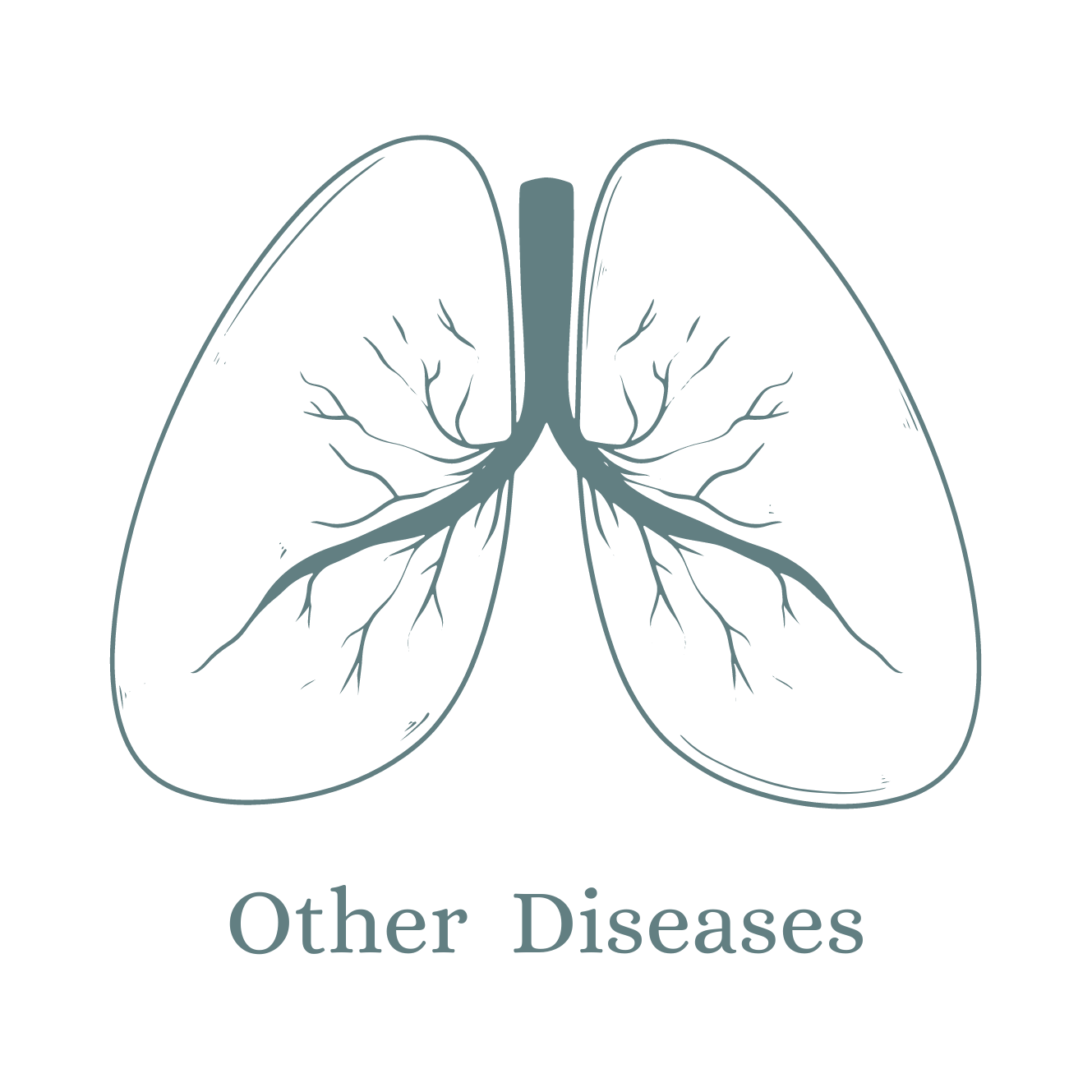
Anti Aging
Elevate your aesthetic clinic to new heights by incorporating exosome therapy into your skincare offerings. Our exosome-based treatments harness the power of cutting-edge science to stimulate collagen and elastin production, enhance skin hydration, and provide potent antioxidant protection. With proven clinical efficacy and safety, exosome therapy delivers remarkable results, reducing the appearance of fine lines, wrinkles, and age spots while promoting cellular renewal and regeneration. Give your clients the gift of youthful, radiant skin with exosome therapy. Contact us today to learn more about adding exosome treatments to your practice and stay at the forefront of anti-aging skincare innovation!
How exosome treatment can help with anti-aging:
Collagen Stimulation: Exosomes derived from mesenchymal stem cells (MSCs) contain growth factors such as transforming growth factor-beta (TGF-β) and insulin-like growth factor (IGF) that stimulate collagen production. Collagen is a key structural protein in the skin that provides strength and elasticity. By promoting collagen synthesis, exosomes help to improve skin firmness and reduce the appearance of fine lines and wrinkles, resulting in a more youthful complexion.
Elastin Enhancement: In addition to collagen, elastin is another crucial protein responsible for skin elasticity and resilience. Exosomes contain factors that promote elastin synthesis and remodeling, contributing to improved skin elasticity and suppleness. Enhanced elastin production helps to minimize the formation of sagging skin and maintain a more youthful facial contour over time.
Hydration and Moisture Retention: Exosomes facilitate the skin's ability to retain moisture by regulating the expression of aquaporins and other water channel proteins. By enhancing skin hydration, exosomes help to plump up the skin, reducing the appearance of fine lines and wrinkles associated with dryness and dehydration. Improved skin hydration also promotes a smoother and more radiant complexion.
Antioxidant Protection: Exosomes contain antioxidants such as superoxide dismutase (SOD) and glutathione peroxidase (GPx) that help neutralize harmful free radicals generated by environmental stressors such as UV radiation and pollution. By scavenging free radicals, exosomes protect skin cells from oxidative damage, which can accelerate the aging process and lead to the formation of wrinkles, age spots, and other signs of aging.
Cellular Renewal and Regeneration: Exosomes promote skin cell turnover and regeneration by delivering growth factors, cytokines, and nucleic acids to target cells. By stimulating the proliferation and differentiation of epidermal stem cells, exosomes help to replace damaged and senescent skin cells with new, healthy ones, resulting in smoother, more vibrant skin with improved texture and tone.
Clinical Efficacy and Safety: Clinical studies and trials have demonstrated the efficacy and safety of exosome therapy for anti-aging purposes. Patients treated with exosome-based interventions have shown improvements in skin texture, tone, and elasticity, as well as reductions in the appearance of fine lines, wrinkles, and age spots. Importantly, exosome treatments are minimally invasive and well-tolerated, making them suitable for individuals seeking non-surgical options for anti-aging skincare.
In summary, exosome-based therapy offers a multifaceted approach to anti-aging by stimulating collagen and elastin production, enhancing skin hydration, providing antioxidant protection, promoting cellular renewal and regeneration, and improving overall skin health and appearance. With further research and clinical advancements, exosome treatments hold great promise for addressing the underlying mechanisms of skin aging and helping individuals achieve a more youthful and radiant complexion.

Dark Eye Circles
Elevate your aesthetic clinic's approach to treating dark eye circles with the transformative power of exosome therapy. Our advanced treatments target the root causes of periorbital hyperpigmentation, offering a comprehensive solution that goes beyond conventional approaches. By regulating melanin synthesis, enhancing microcirculation, and reducing inflammation, exosomes effectively diminish dark eye circles and rejuvenate the delicate skin around the eyes. Experience remarkable results with exosome-based eye creams or targeted injections that improve periorbital pigmentation, texture, and overall appearance. With proven clinical efficacy and safety, exosome treatments offer a non-invasive solution for clients seeking brighter, more youthful eyes. Join the forefront of dark eye circle management and offer your clients the opportunity to rediscover the radiance of their gaze with exosome therapy. Contact us today to learn more about integrating exosome treatments into your aesthetic practice and elevate your clients' eye care experience!
How exosome treatment can address dark eye circles:
Melanin Regulation: Dark eye circles, or periorbital hyperpigmentation, often result from the accumulation of melanin in the skin surrounding the eyes. Exosomes derived from mesenchymal stem cells (MSCs) contain regulatory factors such as microRNAs and cytokines that modulate melanogenesis. By promoting the downregulation of melanin-producing enzymes such as tyrosinase, exosomes help normalize melanin synthesis in the skin, reducing the appearance of dark eye circles.
Enhanced Microcirculation: Poor microcirculation in the periorbital area can contribute to the development of dark eye circles by impairing oxygen and nutrient delivery to the skin. Exosomes possess angiogenic properties mediated by growth factors like vascular endothelial growth factor (VEGF) and fibroblast growth factor (FGF). These factors stimulate the formation of new blood vessels and improve microcirculation, thereby alleviating hypoxia and enhancing the skin's vitality and radiance.
Anti-Inflammatory Effects: Inflammation and oxidative stress play significant roles in the pathogenesis of dark eye circles. Exosomes contain anti-inflammatory molecules such as interleukin-10 (IL-10) and superoxide dismutase (SOD), which suppress inflammatory cytokine production and neutralize reactive oxygen species (ROS). By mitigating inflammation and oxidative damage, exosomes help reduce vascular congestion and skin discoloration associated with dark eye circles.
Collagen Remodeling: Loss of collagen and elastin fibers in the periorbital skin can contribute to the thinning and laxity observed in dark eye circles. Exosomes stimulate collagen synthesis and remodeling through the activation of fibroblasts and the deposition of extracellular matrix proteins. This results in improved skin thickness and elasticity, diminishing the visibility of dark eye circles and promoting a more youthful and rejuvenated appearance.
Depigmentation and Brightening: Exosomes contain factors that inhibit melanin transfer and promote the breakdown of existing melanin deposits in the skin. By regulating the activity of melanocytes and promoting melanosome degradation, exosomes help fade existing hyperpigmentation and prevent the recurrence of dark eye circles. Additionally, exosome-mediated skin brightening enhances the overall luminosity and clarity of the periorbital area, reducing the contrast between dark circles and the surrounding skin.
Clinical Efficacy and Safety: Clinical studies have demonstrated the efficacy and safety of exosome therapy for dark eye circles. Patients treated with exosome-based eye creams or targeted injections have shown significant improvements in periorbital pigmentation, skin texture, and overall appearance. Importantly, exosome treatments are well-tolerated and associated with minimal discomfort or downtime, making them suitable for individuals seeking non-invasive solutions for dark eye circles.
In summary, exosome-based therapy offers a multifaceted approach to addressing dark eye circles by regulating melanin production, enhancing microcirculation, reducing inflammation, promoting collagen remodeling, and facilitating depigmentation and brightening. With continued research and clinical advancements, exosome treatments hold great promise for effectively managing dark eye circles and restoring a youthful and radiant appearance to the periorbital area.

Acne Scars
Take your aesthetic clinic's acne scar treatment to the next level with exosome therapy. Our advanced treatments target the underlying causes of acne scarring, offering a comprehensive solution that delivers remarkable results. By stimulating collagen induction and tissue regeneration, exosomes effectively fill in depressed scars and promote a smoother, more even skin surface. Additionally, their anti-inflammatory properties help prevent the formation of hypertrophic or keloid scars, leading to improved healing and scar resolution. With exosome-based therapy, clients can experience reduced scar depth, increased skin elasticity, and enhanced overall texture. Plus, exosome treatments are minimally invasive and well-tolerated, making them suitable for clients seeking non-surgical options for acne scar revision. Transform your clients' confidence and restore their skin's natural beauty with exosome scar solutions. Contact us today to learn more about integrating exosome treatments into your aesthetic practice and offer your clients the ultimate solution for acne scar management!
How exosome treatment can address acne scars:
Collagen Induction: Acne scars result from the disruption of collagen and elastin fibers in the skin's dermal layer. Exosomes derived from mesenchymal stem cells (MSCs) contain growth factors such as transforming growth factor-beta (TGF-β) and insulin-like growth factor (IGF), which stimulate fibroblasts to produce new collagen and elastin. By promoting collagen induction and remodeling, exosomes help to fill in depressed acne scars and improve the skin's texture and smoothness.
Tissue Regeneration: Exosomes have regenerative properties that facilitate the repair and regeneration of damaged skin tissue. Through the transfer of bioactive molecules such as microRNAs and proteins, exosomes stimulate the proliferation and differentiation of keratinocytes and fibroblasts, leading to the formation of new skin cells and the remodeling of scar tissue. This process helps to minimize the appearance of acne scars and promote a more even skin surface.
Anti-Inflammatory Effects: Inflammation is a key driver of acne formation and scar development. Exosomes possess anti-inflammatory properties mediated by factors such as interleukin-10 (IL-10) and tumor necrosis factor-alpha (TNF-α) receptors. By modulating the inflammatory response, exosomes help to reduce inflammation in acne-prone skin and prevent the formation of hypertrophic or keloid scars. Additionally, exosomes mitigate the inflammatory cascade associated with acne scars, leading to improved healing and scar resolution.
Extracellular Matrix Remodeling: Acne scars are characterized by alterations in the extracellular matrix, including excessive deposition of collagen and abnormal distribution of matrix metalloproteinases (MMPs). Exosomes regulate the activity of MMPs and tissue inhibitors of metalloproteinases (TIMPs), leading to balanced extracellular matrix remodeling. This process helps to break down scar tissue and promote the formation of new, healthy collagen fibers, resulting in smoother and more even-toned skin.
Depigmentation and Texture Refinement: Some types of acne scars, such as post-inflammatory hyperpigmentation and atrophic scars, are associated with skin discoloration and textural irregularities. Exosomes contain factors that regulate melanin production and promote skin cell turnover, leading to depigmentation and texture refinement. By targeting both the color and texture of acne scars, exosome treatment helps to improve overall skin tone and surface smoothness, restoring a more uniform and youthful appearance.
Clinical Efficacy and Safety: Clinical studies have demonstrated the efficacy and safety of exosome therapy for acne scars. Patients treated with exosome-based topical formulations or targeted injections have shown significant improvements in scar appearance, including reduced scar depth, increased skin elasticity, and enhanced overall texture. Importantly, exosome treatments are minimally invasive and well-tolerated, making them suitable for individuals seeking non-surgical options for acne scar revision.
In summary, exosome-based therapy offers a comprehensive approach to addressing acne scars by promoting collagen induction, facilitating tissue regeneration, reducing inflammation, remodeling the extracellular matrix, and improving skin pigmentation and texture. With continued research and clinical advancements, exosome treatments hold great promise for effectively managing acne scars and restoring confidence in individuals affected by acne-related skin concerns.

Even Skin Tone
Elevate your aesthetic clinic's approach to achieving an even skin tone with the transformative power of exosome therapy. Our advanced treatments target the root causes of skin discoloration, offering a comprehensive solution that delivers remarkable results. By regulating melanin production, promoting depigmentation and brightening, and reducing inflammation, exosomes effectively restore balance to the skin, revealing a more luminous and uniform complexion. Additionally, their ability to enhance skin renewal and protect against environmental damage ensures long-lasting results and skin health. With proven clinical efficacy and safety, exosome therapy offers a non-invasive solution for clients seeking to achieve a more radiant and youthful appearance. Join the forefront of skincare innovation and offer your clients the opportunity to unlock the beauty of radiant skin with exosome brightening. Contact us today to learn more about integrating exosome treatments into your aesthetic practice and help your clients achieve their desired complexion goals!
How exosome treatment can help achieve an even skin tone:
Melanin Regulation: Uneven skin tone often results from irregular melanin production and distribution in the skin. Exosomes derived from mesenchymal stem cells (MSCs) contain regulatory factors such as microRNAs and cytokines that modulate melanogenesis. By suppressing overactive melanocytes and promoting melanosome transfer to neighboring keratinocytes, exosomes help regulate melanin production and distribution, leading to a more balanced and uniform skin tone.
Depigmentation and Brightening: Exosomes contain factors that inhibit tyrosinase activity, the enzyme responsible for melanin synthesis. Additionally, exosomes promote the breakdown of existing melanin deposits in the skin through mechanisms such as autophagy and proteolysis. By reducing melanin content and dispersing pigment granules, exosomes help fade existing hyperpigmentation and prevent the formation of new dark spots, resulting in a brighter and more luminous complexion.
Anti-Inflammatory Effects: Chronic inflammation can exacerbate skin discoloration and contribute to the development of uneven skin tone. Exosomes possess anti-inflammatory properties mediated by factors such as interleukin-10 (IL-10) and transforming growth factor-beta (TGF-β). By suppressing inflammatory cytokine production and modulating immune responses, exosomes help alleviate inflammation and promote a calmer and more balanced skin environment, which is conducive to achieving an even skin tone.
Enhanced Skin Renewal: Exosomes stimulate skin cell turnover and renewal through the transfer of growth factors and signaling molecules. By promoting the proliferation and differentiation of keratinocytes, exosomes facilitate the shedding of damaged and pigmented skin cells, revealing fresh and evenly pigmented skin underneath. This process helps to improve overall skin texture and tone, leading to a more radiant and youthful appearance.
Protection Against Environmental Damage: Exosomes contain antioxidants and free radical scavengers that help protect the skin from environmental stressors such as UV radiation and pollution. By neutralizing reactive oxygen species (ROS) and preventing oxidative damage to skin cells, exosomes help maintain skin health and integrity, which is essential for achieving and maintaining an even skin tone.
Clinical Efficacy and Safety: Clinical studies have demonstrated the efficacy and safety of exosome therapy for promoting an even skin tone. Patients treated with exosome-based topical formulations or targeted injections have shown significant improvements in skin pigmentation, including reduced hyperpigmentation and increased skin brightness and clarity. Importantly, exosome treatments are well-tolerated and associated with minimal side effects, making them suitable for individuals seeking non-invasive options for achieving a more uniform and radiant complexion.
In summary, exosome-based therapy offers a multifaceted approach to achieving an even skin tone by regulating melanin production, promoting depigmentation and brightening, reducing inflammation, enhancing skin renewal, and protecting against environmental damage. With continued research and clinical advancements, exosome treatments hold great promise for effectively addressing skin discoloration and helping individuals achieve their desired complexion goals.

Treat Burns
Elevate your burn treatment protocols with the groundbreaking potential of exosome therapy. Our advanced treatments offer a multifaceted approach to burn healing, addressing key factors such as tissue regeneration, inflammation reduction, and collagen remodeling. By harnessing the regenerative power of exosomes derived from mesenchymal stem cells (MSCs), we stimulate the proliferation of essential skin cells and promote the formation of new blood vessels, accelerating the healing process and minimizing scar formation. Additionally, exosomes provide effective pain management and enhance patient comfort during the recovery journey. With proven clinical efficacy and safety, exosome therapy offers a promising solution for patients of all ages and burn severities. Join us in revolutionizing burn care and improving the lives of those affected by burn injuries. Contact us today to learn more about integrating exosome treatments into your burn treatment regimen and offer your patients the advanced care they deserve!
How exosome treatment can aid in the treatment of burns:
Tissue Regeneration: Burns cause significant damage to the skin, often resulting in impaired wound healing and scar formation. Exosomes derived from mesenchymal stem cells (MSCs) contain a diverse array of growth factors, cytokines, and extracellular matrix components that facilitate tissue regeneration. By stimulating the proliferation and migration of keratinocytes, fibroblasts, and endothelial cells, exosomes promote the formation of new blood vessels and skin tissue, accelerating the healing process and minimizing scar formation.
Anti-Inflammatory Effects: Inflammation is a key component of the burn healing process and can exacerbate tissue damage if left unchecked. Exosomes possess potent anti-inflammatory properties mediated by factors such as interleukin-10 (IL-10) and tumor necrosis factor-alpha (TNF-α) receptors. By modulating the inflammatory response, exosomes help reduce edema, erythema, and pain associated with burns, while also preventing excessive scar tissue formation.
Angiogenic Stimulation: Adequate blood supply is essential for optimal wound healing, as it delivers oxygen, nutrients, and immune cells to the injured tissue. Exosomes contain angiogenic factors such as vascular endothelial growth factor (VEGF) and fibroblast growth factor (FGF), which promote the formation of new blood vessels (angiogenesis) in the burn area. This enhanced blood flow improves tissue oxygenation and nutrient delivery, facilitating the regeneration of healthy skin and reducing the risk of complications such as infection and necrosis.
Collagen Remodeling: Burns often result in the formation of hypertrophic scars or contractures due to excessive collagen deposition and abnormal wound healing. Exosomes modulate the activity of matrix metalloproteinases (MMPs) and tissue inhibitors of metalloproteinases (TIMPs), which regulate collagen synthesis and degradation. By promoting a balanced extracellular matrix remodeling process, exosomes help prevent scar contracture and promote the formation of pliable, functional skin tissue.
Pain Management: Burns can cause intense pain and discomfort, which can hinder the healing process and impact the patient's quality of life. Exosomes exert analgesic effects through various mechanisms, including the modulation of pain signaling pathways and the release of endogenous opioids. By alleviating pain and promoting a more comfortable healing environment, exosomes enhance patient comfort and compliance with treatment regimens.
Clinical Efficacy and Safety: Clinical studies and case reports have demonstrated the efficacy and safety of exosome therapy for burn treatment. Patients treated with exosome-based interventions have shown accelerated wound healing, reduced scar formation, and improved functional outcomes compared to conventional therapies. Importantly, exosome treatments are minimally invasive and well-tolerated, making them suitable for patients of all ages and burn severities.
In summary, exosome-based therapy offers a promising approach to burn treatment by promoting tissue regeneration, reducing inflammation, stimulating angiogenesis, remodeling collagen, managing pain, and improving clinical outcomes. With further research and clinical validation, exosome treatments have the potential to revolutionize burn care and improve the lives of patients affected by burn injuries.

Diminish Scars
Elevate your aesthetic clinic's scar treatment protocols with the groundbreaking power of exosome therapy. Our advanced exosome-based treatments offer a comprehensive approach to scar reduction by targeting key factors such as collagen modulation, tissue remodeling, and angiogenesis promotion. With proven clinical efficacy and safety, exosome therapy delivers remarkable results, improving scar texture, thickness, and tone. Say goodbye to scar-related inflammation, discoloration, and uneven texture with exosome treatments that are minimally invasive and well-tolerated. Join the forefront of scar management innovation and offer your clients the opportunity to achieve smoother, more even skin with exosome therapy. Contact us today to learn more about integrating exosome treatments into your aesthetic practice and revolutionize scar treatment outcomes!
How exosome treatment can help diminish scars:
Collagen Modulation: Scars form when the body's wound healing response leads to excessive collagen production and deposition, resulting in raised or depressed areas of skin. Exosomes derived from mesenchymal stem cells (MSCs) contain growth factors such as transforming growth factor-beta (TGF-β) and insulin-like growth factor (IGF), which regulate collagen synthesis and remodeling. By promoting a balanced collagen turnover process, exosomes help to remodel scar tissue, smoothing out raised scars and filling in depressed areas, resulting in a more even skin surface.
Tissue Remodeling: Exosomes facilitate the remodeling of scar tissue by promoting the turnover of extracellular matrix components such as collagen, elastin, and proteoglycans. Through the transfer of microRNAs and other bioactive molecules, exosomes modulate the activity of matrix metalloproteinases (MMPs) and tissue inhibitors of metalloproteinases (TIMPs), which regulate the breakdown and synthesis of collagen fibers. This remodeling process helps to soften and flatten scars, improving their texture and appearance over time.
Angiogenesis Promotion: Adequate blood supply is crucial for optimal wound healing and scar resolution. Exosomes contain angiogenic factors such as vascular endothelial growth factor (VEGF) and fibroblast growth factor (FGF), which stimulate the formation of new blood vessels (angiogenesis) in the scar tissue. By enhancing blood flow to the area, exosomes promote oxygen and nutrient delivery to the scar site, facilitating tissue regeneration and improving the overall health and appearance of the scar.
Anti-Inflammatory Effects: Inflammation plays a key role in scar formation and maturation. Exosomes possess anti-inflammatory properties mediated by factors such as interleukin-10 (IL-10) and tumor necrosis factor-alpha (TNF-α) receptors. By modulating the inflammatory response, exosomes help reduce scar-related inflammation, minimizing scar redness, pain, and itchiness, and promoting a more favorable healing environment.
Depigmentation and Texture Refinement: Some scars are associated with hyperpigmentation or hypopigmentation, as well as textural irregularities such as roughness or induration. Exosomes contain factors that regulate melanin production and promote skin cell turnover, leading to depigmentation and texture refinement. By targeting both the color and texture of scars, exosome treatment helps to improve overall scar appearance and blend them more seamlessly with surrounding skin.
Clinical Efficacy and Safety: Clinical studies and case reports have demonstrated the efficacy and safety of exosome therapy for scar reduction. Patients treated with exosome-based interventions have shown significant improvements in scar appearance, including reduced thickness, improved texture, and enhanced skin tone. Importantly, exosome treatments are minimally invasive and well-tolerated, making them suitable for patients seeking non-surgical options for scar improvement.
In summary, exosome-based therapy offers a comprehensive approach to scar reduction by promoting collagen modulation, tissue remodeling, angiogenesis promotion, inflammation reduction, depigmentation, and texture refinement. With further research and clinical validation, exosome treatments have the potential to revolutionize scar management and improve the quality of life for individuals affected by scars.

Stretch Marks
Elevate your approach to stretch mark treatment with the innovative power of exosome therapy. Our advanced treatments offer a comprehensive solution to address the underlying causes of stretch marks, delivering remarkable results that restore skin confidence. By stimulating collagen remodeling and promoting tissue regeneration, exosomes effectively diminish the appearance of stretch marks, reducing their size, depth, and pigmentation. Additionally, their anti-inflammatory properties alleviate tissue damage and foster a conducive environment for skin repair. With proven clinical efficacy and safety, exosome therapy offers a non-invasive solution for patients seeking to improve the appearance of their skin without downtime or discomfort. Join us in revolutionizing stretch mark management and offer your patients the opportunity to rediscover smooth, rejuvenated skin with exosome stretch mark solutions. Contact us today to learn more about integrating exosome treatments into your practice and help your patients achieve their desired skin transformation!
How exosome treatment can address stretch marks:
Collagen Remodeling: Stretch marks, or striae distensae, result from the disruption of the extracellular matrix, particularly collagen and elastin fibers, due to excessive mechanical stretching of the skin. Exosomes derived from mesenchymal stem cells (MSCs) contain bioactive molecules such as transforming growth factor-beta (TGF-β) and vascular endothelial growth factor (VEGF), which play pivotal roles in collagen synthesis and remodeling. By modulating these signaling pathways, exosomes promote the deposition of new collagen fibers and the restructuring of the extracellular matrix, ultimately improving the appearance of stretch marks.
Regenerative Effects: MSC-derived exosomes exert potent regenerative effects on damaged tissues. Through the transfer of microRNAs, mRNA, and proteins, exosomes stimulate the proliferation and differentiation of resident skin cells, such as fibroblasts and keratinocytes, within the stretch mark microenvironment. This regenerative response facilitates the repair of dermal and epidermal structures, leading to a reduction in the size and depth of stretch marks.
Anti-Inflammatory Properties: Chronic inflammation is a hallmark of stretch mark formation and progression. Exosomes possess anti-inflammatory properties mediated by factors like interleukin-10 (IL-10) and indoleamine 2,3-dioxygenase (IDO), which suppress pro-inflammatory cytokine production and promote immune tolerance. By attenuating the inflammatory cascade, exosome therapy mitigates tissue damage and fosters a conducive environment for tissue regeneration and remodeling.
Enhanced Extracellular Matrix Integrity: Stretch marks are characterized by aberrant collagen arrangement and diminished extracellular matrix integrity. Exosome-mediated stimulation of collagen production, along with the modulation of matrix metalloproteinases (MMPs) and tissue inhibitors of metalloproteinases (TIMPs), restores the balance between matrix synthesis and degradation. This results in improved tensile strength and elasticity of the skin, reducing the visibility of stretch marks.
Clinical Efficacy and Safety: Clinical studies have demonstrated the efficacy and safety of exosome therapy for stretch marks. In controlled trials, patients treated with exosome injections or topically applied exosome formulations have shown significant improvements in the appearance of stretch marks, including decreased pigmentation, smoother texture, and reduced width and length. Importantly, exosome therapy is minimally invasive, with negligible risk of adverse reactions or downtime, making it a favorable option for patients seeking non-surgical interventions for stretch mark management.
In conclusion, exosome-based therapy represents a promising approach for the clinical management of stretch marks by promoting collagen remodeling, tissue regeneration, inflammation resolution, and extracellular matrix integrity. With further research and refinement, exosome treatments hold considerable potential for enhancing the outcomes and quality of life for individuals affected by stretch marks

